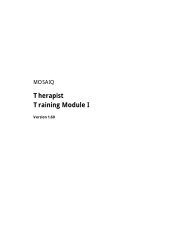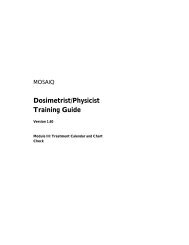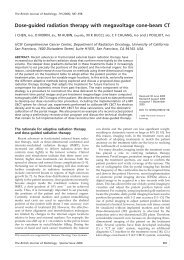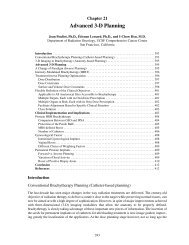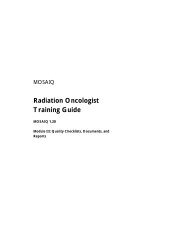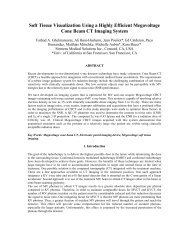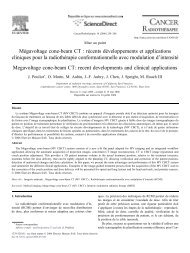IB Senior Educational Objectives - UCSF Radiation Oncology
IB Senior Educational Objectives - UCSF Radiation Oncology
IB Senior Educational Objectives - UCSF Radiation Oncology
You also want an ePaper? Increase the reach of your titles
YUMPU automatically turns print PDFs into web optimized ePapers that Google loves.
Rev. 9/14/10<br />
care instructions (including any required prescriptions etc.). The residents are also<br />
expected to participate in the management of acute and late toxicities of therapy.<br />
5. CyberKnife: Participate in the simulation, planning, and treatment delivery. They<br />
must accompany the attending physician to verify treatment setup of the first<br />
treatment fraction (if multiple treatment fractions are given). They are also<br />
expected to assist the attending physician with providing patients post-treatment<br />
care instructions (including any required prescriptions etc.). The residents are also<br />
expected to participate in the management of acute and late toxicities of therapy.<br />
6. Brain Brachytherapy: The resident is responsible for actively participating in the<br />
procedure, accompanying attending physician to the operating theatre, assisting in<br />
the seed placement, documenting and observing relevant safety protocols,<br />
providing patient and family members with post-implant instructions.<br />
7. Read/Study<br />
A list of relevant reference articles will be located on the department server for<br />
resident download.<br />
8. Maintain service list of patients (current, past, and pending) and continue to update<br />
the list to ensure adequate follow-up of pending patient care items.<br />
9. Neurocognitive Clinic (Tuesdays)<br />
a. On Tuesday of every week (pending a clinic change), the residents are expected to be<br />
in the clinic with Dr. Caroline Racine (in-house neuropsychologist) to learn and<br />
observe how to take a cognitive history and how to administer cognitive screening<br />
exam (MOCA). They will also be expected to learn the basic brain-behavior<br />
relationships and effects of intervention on neuropsychological test results.<br />
b. The residents will be supervised on this day by Dr. Racine and are responsible for<br />
completing any reading or tasks assigned.<br />
10. New Patients<br />
a. Obtain records and prepare for patient prior to their arrival. Present case to<br />
attending as indicated. Identify clinical issues and questions raised by a specific case.<br />
Make recommendations for patient’s care based on evidence found in literature. Cite<br />
relevant literature in summary write-up. Discuss relevant literature with attending.<br />
b. Devise and review treatment plan based on patient indications and planning.<br />
c. Follow-up on pending surgeries, pathology, medical records, imaging, and other<br />
relevant clinical patient information.<br />
d. Attend all simulation visits; order relevant simulation studies.<br />
e. Be prepared to discuss risks and benefits of radiation therapy with patients when<br />
requested by the attending physician.<br />
f. Attend all new patient starts and review port films at the treatment machine.<br />
g. In treatment planning, the resident is responsible for contouring the following tumor<br />
and normal tissue structures:<br />
i. Cranial Cases:<br />
1. Tumor (or surgical cavity); GTV, CTV, and PTV (as indicated)<br />
2. Bilateral Eyes<br />
3. Bilateral Optic Nerves<br />
4. Chiasm<br />
5. Bilateral Cochlea and Vestibular Apparatus<br />
6. Pituitary Gland<br />
7. Hypothalamus<br />
8. Bilateral Temporal Lobes<br />
4




